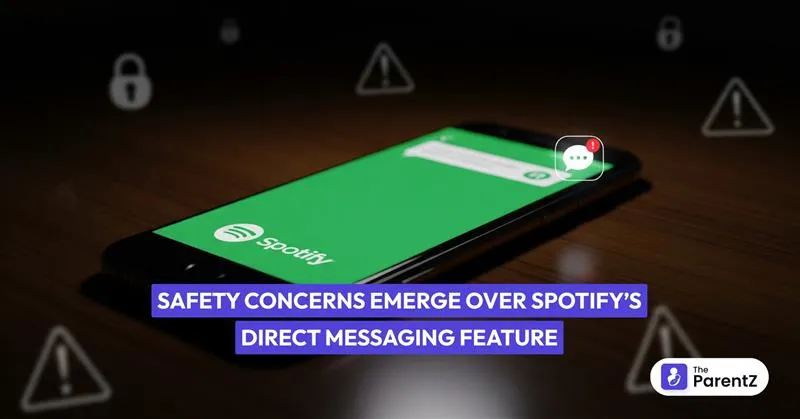Imagine your child opening Spotify to enjoy music or a podcast, and finding a private message waiting for them from someone you’ve never heard of. A space that once felt safe for listening and learning now becomes yet another social platform kids have to handle. That’s the situation many parents are worried about with Spotify’s launch of its new feature: Messages.
While Spotify sells it as a fun way to share songs and podcasts with friends and family, experts warn that it’s not without risks. For parents already juggling their child’s presence on multiple apps like Instagram, Snapchat, or TikTok, this is one more communication avenue to keep an eye on.
What Is Spotify Messages?
Spotify announced that users can now send one-on-one direct messages within the app. Available to users aged 16 and above (at least on paper), the feature allows sharing of songs, playlists, podcasts, and audiobooks directly through a chat-like interface.
- Teens can react with text or emojis.
- Conversations happen in-app between users who have interacted before, like collaborative playlists, Jams, Blends, or shared family plans.
- New message requests can be accepted or rejected.
While Spotify highlights how this helps families bond over songs or book club audiobooks, what it really does is turn Spotify into a social space, not just a music app. And with that comes the same concerns parents face with other messaging platforms: privacy, exposure, and safety.
Why Parents Should Pay Attention
If the feature is only open to people 16+, what’s the big deal?
The thing is that Spotify doesn’t check IDs. Kids can (and often do) lie about their age when signing up for these platforms. That means younger teens, even tweens, could gain access to direct messaging without parents realizing it.
Once inside the feature, children could receive:
- Unwanted messages from strangers if privacy filters fail.
- Explicit or adult content shared through songs or even just text.
- Harassment or bullying disguised as casual chatting.
- Phishing or scam attempts, where bad actors pretend to be friends or creators.
Spotify’s Safety Measures
To be fair, Spotify hasn’t ignored safety altogether. The company says:
- You must accept a message request before chatting.
- Users can block or report accounts that send harmful content.
- Conversations are encrypted in storage and in transit.
- Spotify claims to use scanning technology to detect illegal or harmful content.
These are solid steps. But, as with all platforms, filters are not foolproof. Much of the responsibility still falls on the user, and for young users, that means parents must be involved.
The Hidden Risks Few Parents Consider
Beyond simple stranger danger, parents should think about broader risks this feature brings:
- Music-linked conversations: Spotify content itself might be harmless, but the chat around it can create opportunities for manipulation. For example, someone could start chatting about a shared playlist, then steer the conversation into unsafe territory.
- Digital footprints: Every conversation may add to a digital trail kids aren’t aware they’re leaving behind.
- Phishing attacks: Since messages come from within Spotify, the app kids already trust. Teens may let their guard down and click on harmful links.
- Age dishonesty: A 13-year-old claiming to be 16 to gain access means they’re now in an environment meant for older teens.
What Parents Can Do Right Now
Parents don’t have to panic or ban Spotify completely. With some nudges and clear boundaries, kids can still enjoy music without falling into the darker side of messaging.
Steps to take:
- Check account settings: Verify your child’s registered age on Spotify. If they’re under 16, consider creating or sticking to Spotify Kids.
- Enable parental controls: Spotify offers explicit content filters—turn them on.
- Talk openly about new features: Kids should know why these features can be risky. Use this update as a chance to have that safety talk again.
- Teach how to block and report: Walk your child through the steps to block or report someone. Role-play scenarios so they know what to do if something happens.
- Keep an eye on app updates: Spotify says this is “just the beginning.” Features often start simple but evolve quickly. Today it’s text and emojis, tomorrow it could be voice notes or media sharing.
- Make message monitoring a given: For younger teens, normalize the idea that you, as a parent, may occasionally check their account for safety. Be upfront.
Teaching Digital Responsibility
No parental control system will ever catch everything. Spotify itself admits it can scan for harmful activity, but ultimately, it’s conversations and behavior at home that protect kids the most.
Let your teen know that:
- They never have to hide conversations from you.
- It’s okay to block people (even peers) if they feel uncomfortable.
- Not every “cool song recommendation” needs a reply.
- If something feels wrong, they should come to you immediately.
This turns the Spotify Messages feature from something scary into another chance to teach kids resilience and responsibility online.
Conclusion
Spotify’s new direct messaging tool makes music sharing easier, but it also opens a door to the risks every messaging platform brings. Kids don’t always recognize red flags in conversations, which is why parents need to step in with guidance early on.





Be the first one to comment on this story.